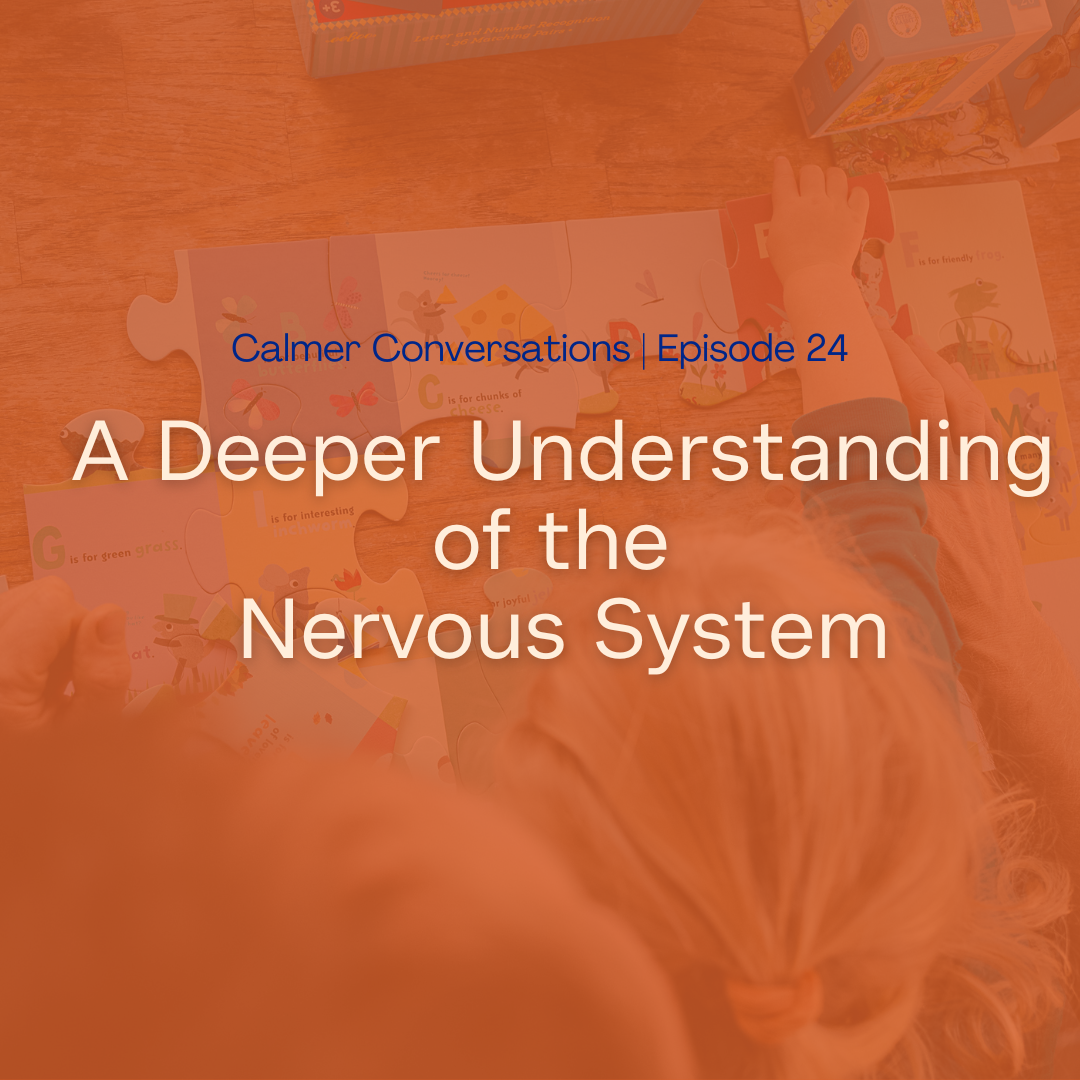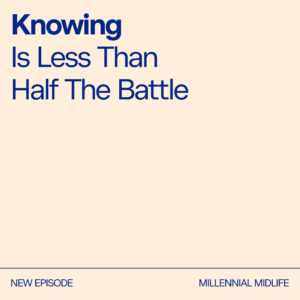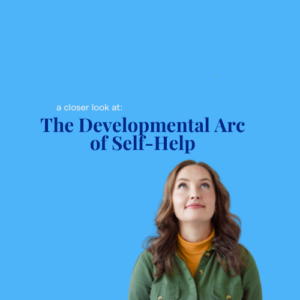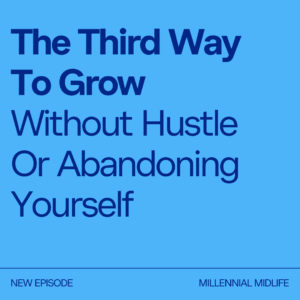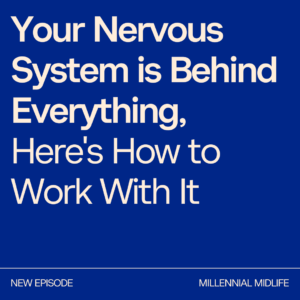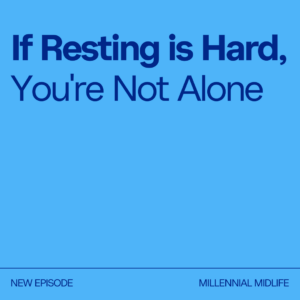Cecelia Baum Mandryk (00:01.218)
Hey and welcome to Calmer Conversations, episode 24. I’m Cecilia, your host. Today we’re going to answer the question, what is your nervous system? And then the second question, why should you care about it? Which I think is a totally fair question. If you’re in any kind of personal development or self-development or mindfulness world, you’ve probably heard about your nervous system and that it’s important for making change, but you might not know exactly why it’s important for you.
or even what it does within your body because maybe the last time you heard about it was freshman year biology class. If you’re in the US, I think that’s when I had biology, if you didn’t take AP later on. Okay, that’s what we’re covering today. I think if you’re here, if you want to feel differently in life, if you want to make changes, you want to listen to this episode. I will say that this can…
nervous system stuff can venture into the esoteric and academic. And one of my goals is always to take concepts like that and help you understand them. If you haven’t been exposed to them again recently, but help you understand them in a way that’s really applicable for you so that you can make changes in your life. And that’s always my goal. When I do this kind of stuff is I want you to be able to take it, which you to be able to use it. So while this may have some academic
nature to it because we are answering the question what is the nervous system. I want to just offer that I’m going to do it from a place of helping you make changes as well. Okay so when you think about the nervous system, the nervous system is the system within your body that receives information and communicates it. So receives information from the outside world
and it sends information throughout the body. So maybe even first you might think about it sending information throughout the body, and then you might think about it receiving information from stimuli outside of you. So information from your physical environment. This is, I don’t know, this is kind of crucial to your existence, right? And I’m gonna also add a little bit in about Polyvagal Theory and the vagus nerve because I think it’s so crucial.
Cecelia Baum Mandryk (02:24.142)
But that’s at the very most basic level, that’s what your nervous system is. Your nervous system is divided up into two main parts. There’s the central nervous system, which is your brain and spinal cord. And then there’s the peripheral nervous system. And the peripheral nervous system has the controlled part of it, the somatic movement. So you like moving your arms. I’m moving my arms if you’re watching this. But it also has the autonomic nervous system.
And the autonomic nervous system controls things like digestion, your heart rate, your pupil dilation. It controls all kinds of things like that. And the autonomic nervous system is works in cahoots with your primitive brain. So if you’re not new to my work, you know that there is or if you’re not just new to like, I mean, this isn’t just me, right? Like lots of it’s not my work. There’s so many people who have done this work and are doing this work.
your primitive brain and your central and your autonomic nervous system are the parts of you that are in control moment to moment. They’re the ones who are helping you stay safe, are conserving energy and are seeking out pleasure. So the autonomic nervous system receives information from the outside world. That’s the one that most people
So let me back up just a minute. So you have like the your brain and your spinal cord that are obviously very important to your functioning as a human being and to your nervous system. But oftentimes in mindfulness or in self development worlds or growth worlds. Excuse me.
Cecelia Baum Mandryk (04:11.598)
Sorry about that. So oftentimes when people are talking about the nervous system, when they’re talking about nervous system work, they’re specifically talking about your autonomic nervous system. This part of your nervous system takes outside stimulus, stimuli from your environment, interprets it in some way and assigns you to one of two states.
it assigns you as safe or danger. That’s its main job, is to interpret what’s happening around you and interpret and then say you’re safe or you’re in danger. It’s not perfect and it’s using a lot of historical data to determine whether something is safe or dangerous. And…
It’s using your brain programming, your primitive brain’s programming. If you’ve heard me use the analogy kind of that it’s your primitive brain is a little bit like an open source computer program and anyone can go in and write lines of code. And then we kind of repeat themselves, repeat them to ourselves as if they are truths of the universe. Over and over again, until we rewrite those lines of code, your nervous system is using is filtering what it experiences in
your environment through the lens of your primitive brains programming. I’m to say that again just so to hopefully make help make sense. So your autonomic nervous system which assigns you in the danger or safe category in the moment no matter what’s happening around you is filtering the information that it gathers from the outside world through
your preconditioning through the thoughts that you most think most frequently through your own history. So I’ve said this before on the podcast, but I think it’s worth saying again, we’ve received, I forget what the actual number is, but like billions of pieces of information every single second. And your brain cannot process, it can process so much. It’s so good at processing things, but it cannot process that much. And so that it filters what you actually see.
Cecelia Baum Mandryk (06:31.455)
based on what you’re expecting to see primarily and what you have seen in the past. And so your primitive brain, and that’s more like the amygdala, know, the kind of reptilian part of your brain, which helps you stay safe in a moment, conserve energy in the moment, see pleasure in the moment, helps you stay alive. This part of your brain isn’t concerned about you.
writing that book and achieving happiness and thriving, it’s helping you stay alive right now, avoid danger right now, works with your autonomic nervous system. So your autonomic nervous system is processing information from the environment based on your thoughts, based on your past experiences, based on all these different things, and it’s assigning you safe or danger mode. Another way of saying safe or danger mode is your parasympathetic nervous response, which is the safe mode.
and the danger mode, which is the sympathetic nervous system response. Okay, so the parasympathetic nervous system response is rest, digest, but it’s also create. So you’re creating things, you’re creatively thinking, if I can get that out of my mouth. You’re creatively thinking, so you’re resting, digesting, you’re connecting with people, you’re creatively thinking, your cognitive thinking capacity is higher in that space and…
most importantly for maybe what we’re talking about. I mean the connection is pretty powerful too, but you are able to make change more easily and actually change is accessible. I might even argue that change is possible when you’re in the parasympathetic place. This is also what people call nervous system regulation. When your nervous system is quote unquote regulated, you are in the parasympathetic response. When you are in the sympathetic response,
That is when your nervous system, your autonomic nervous system has assigned you to danger mode. That’s when you’re in fight or flight, also freeze, which means you’re not doing much of anything, you’re fawning, which is people pleasing, flocking, getting together with other people. This is also where procrastination happens, all kinds of things like that. It’s something feels dangerous. And so your body goes into, it’s in danger mode. It’s trying to protect you. It’s trying to keep you safe. It’s trying to conserve energy. And in that place,
Cecelia Baum Mandryk (08:50.112)
It’s very hard to make change. It’s very hard to connect with yourself or other people or have compassion to be in that kind of head space. It’s also really hard to digest things, for instance. We’re not gonna get into that. This isn’t gonna turn into a health podcast. But just know that if you’re somebody who has, for instance, digestive issues, it may be because your nervous system spends a lot of time in dysregulation. And so if somebody is saying that I’m
that you’re dysregulated or you’re out of regulation, it’s you’re in the sympathetic response. Most of us, okay, so that’s the nervous system, right? So it’s taking information, it’s filtering it, it’s assigning you one or the other, and it’s adjusting all of the systems within your body based on that information. This information is often faulty, which is why you should care about it. This information, the filters that your brain is giving your nervous system are often faulty.
They’re often based on misinformation or partial information or information you gathered when you were a young child. So it was helpful then, and it was adaptive then to keep you alive and safe. But now it’s probably not helping you. And yet, like the thoughts that are going through that open source computer program, like those thoughts, your nervous system state and how it interprets what’s going on around you.
is dictating what you think, how you feel, what you do, kind of the experience you have in life in a very, to a very large degree. And this is kind of where the polyvagal theory comes in, in that your nervous system is actually adaptive. So your nervous system,
is the vagus nerve innervates your torso and it’s one of the main ones that controls your heart rate, controls your breath rate, it controls your digestion, it controls sending resources out to your limbs instead of staying in the main part of your body, which again is why digestion is hard. If you think about moving into fight or flight, it makes more sense for your body to have resources in the limbs where they might need to use them, not having resources digesting the hamburger that you just ate.
Cecelia Baum Mandryk (11:11.978)
The cool thing about the vagus nerve, well, I won’t go into that right now. You can go on a whole other tangent. But the polyvagal theory, which is looking at nervous system regulation, which is helping you, which is a way of framing what’s happening, says that the nervous system evolved to be adaptive and that your behavior and psychological experience, so what you do and how you feel,
what you think are in some way, some larger small way, I think most of the time it’s a large way, driven by the state of your nervous system. And the reason is, is because this is helping you to survive, to avoid danger, to conserve energy, to seek out pleasure, acceptance, safety in your life. And so your nervous system with its imperfect information is trying to help you survive.
And if you are trying to make, so that’s what the nervous system is. Why you should care about it, that’s kind of what I was just getting into, is that it drives what you do, right? So the thoughts that you have drive what you do and how you feel. And the state of your nervous system drives how you feel and what you do. And also, it kind of interacts with your thoughts on that level. And so if you want to feel differently, if you want to do something differently,
you have to be able to work with your nervous system. And so most of the time we try and make change from this place of forcing change at the action level, at the like how level, and that’s really enticing because most of us know cognitively what we want to do or what we should be doing or the steps we might take to get to where we wanna get. However, if you are trying to make change at that how level,
but you haven’t addressed what’s happening in your nervous system and brain, the change will feel really hard. It will feel like you’re kind of like forcing something, like you need a lot of willpower or self-discipline, and it won’t last very long. And last very long is like relative, right? So some people, it might last six months. Some people it’s like, I could do it for two days. And it depends on what you’re trying to change and how ingrained the patterning is of your nervous system and brain.
Cecelia Baum Mandryk (13:35.32)
But if you work with your nervous system, if you work with the thoughts in your brain, what happens is you change things at a, you understand things at a root cause level, why you are or are not doing something. And then once you make the shifts at that kind of root cause level, the changes you wanna make will feel easy. They’ll feel kind of like they just flow, like almost like you don’t even have to try to make any changes.
and they will be longer lasting because you’ve done the work to change the foundational nature of your activities. So most of us know the how. I’ve said this before in the podcast of like cognitively knowing what you want to do and how to do something is actually such a small part of making the change. It’s a really small part of making the change. We think it’s everything. Most people would say like, that’s 99 % of the work.
I think that’s probably closer to about like one to five percent of the work, maybe a little bit more, because the how can be different in so many different ways for so many different people. But if you the nervous system and brain work, the like background information, understanding why you do what you do right now and what’s keeping you from doing what you want to do while you’re getting stuck, that’s 95 percent of the work. Right. And so if you do, if you spend time on that 95 percent, the other stuff just happens.
just kind of like, I mean, the number of times that clients say to me like, can’t eat, we like, don’t even talk about exercise and all of a sudden I’m exercising, isn’t that so neat, right? And that was like my big goal and this thing that I could never do and now I’m just doing it I don’t even have to think about it, isn’t that so neat? That’s the kind of a change and feeling that is available to you when you work with your nervous system and your brain. The other reason why you should care about your nervous system is when you’re in regulation,
You can be kind to yourself and other people. You can connect with other people on a really deep level that’s not available to you when your nervous system is not regulated. You can think creatively and cognitively on places that you maybe haven’t been able to do before. You can digest your food a lot better. So you can do all these other things. So honestly, like if you want to make change in your life and you want to do it without forcing yourself,
Cecelia Baum Mandryk (15:52.568)
You want to make lasting change without a boatload of self-discipline, which will run out at some point and you’ll just revert. Then you need to start to pay attention to your your conditioned nervous system states, create safety for yourself there, and then move forward. This is exactly what I do with people and I have a course that goes through this.
like who that will teach you about the nervous system in more detail, but then also help you become an expert in your specific nervous system. So you understand your triggers, you understand your patterning, you understand your past and how it’s impacting your present and your future and making changes with tools from that space. Like how do you create safety? Like how do you regulate in the moment? Like how do you work with your breath in a positive way? How do you use your vagus nerve to your advantage?
so that you can make changes with ease and without self-discipline. So that’s called nervous system self-care. It’s gonna be linked in the show notes. Also, if that course for whatever reason feels inaccessible to you and you just wanna start making changes, grab my mini course. Grab the five minute shift. It’s $29. It will help you start to identify what you’re feeling in your body, which is like your nervous system.
It’ll help you start to accept it and allow it and work with it from that place. And it is an amazing place to start making changes. Okay. So that’s what the nervous system is and how to and why you should care about it. If you want to start working with it, you can listen to this podcast. You can follow me on Instagram. But the nervous system course is really powerful. Everyone who’s taken it has said it’s just like blown them away in terms of what they’ve gotten out of it and how potent the information is. So
Give yourself that as a kind of gift if you’d like to move forward, making change from a different place and also feeling calmer in your life, right? Like having that sense of calm and peace and ease in your brain that is available and accessible to all of us. I promise no matter how much you think you are a certain type of person, I know you can make these changes and I know you can feel better and different in your life. Okay, that is a short and sweet, what is the nervous system and why should you care about it?
Cecelia Baum Mandryk (18:07.202)
from this perspective of self-development or trying to feel different in your brain and body. All right, thanks so much for joining. Great to see you. We’re getting close. Yeah, we’re midway through December, I think, when this will come out. So I hope that the holidays are going well for you. Hopefully this will help you if you’re feeling maybe stuck or something within the holidays. And I will see you next week.

